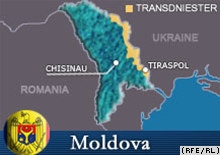The Transdniester region
The Transdniester region is a Russian-speaking sliver of Moldova along the border with Ukraine that declared its independence in 1990. Moldova and Transdniester fought a brief war in 1992 in which nearly 2,000 died. The war ended with Russian troops in Transdniester, and Russian troops are still there today.
There was a panel discussion in Washington on January 11 about the Transdniester region and the prospects for settling the conflict. The panel included Stefan Gligor and Stela Jantuan of the Information, Analysis, and Prognosis Service of the Moldovan parliament and Alexandru Flencha, head of the information and analysis division of Moldova's Ministry of Reintegration.
You can listen to the 90-minute panel discussion here (Real Media) or here (Windows Media.)
Lost in the attention given to Ukraine when Gazprom suspended gas deliveries to that country was the fact Gazprom also suspended gas deliveries to Moldova. Ukraine had been delivering gas to Moldova from its own supplies, but Moldova and Gazprom recently came to an agreement.
Since the gas pipelines cross the Transdniester region, though, Moldova was nervous about the prospect of this breakway region controlling its gas supply. That played a role in the agreement with Gazprom.
In this post, I pointed out that Romania and the US signed an agreement on a US base in Romania near the Black Sea. This is not far from those Russian troops in the Transdniester region, and if those troops remain, having US and Russian troops in such close proximity could make for interesting times.
 | Transdniester is a poor region, and is known for criminal activites such as money laundering and arms and drug trafficking. There have been talks over the years trying to settle the issue. RFE/RL reports that the most recent talks have ended with no settlement. (image is from RFE/RL) |
Talks between Moldova's government and its breakaway Transdniester region on ending their 15-year-old dispute have ended with no progress.
The two days of talks, held in Chisinau, and in the Transdniester's capital, Tiraspol, were mediated by the Organization for Security and Cooperation in Europe (OSCE).
OSCE mission chief William Hill said the two sides remain far apart on all issues.
Russian speaking Transdniester proclaimed independence in 1990, fearing Moldova would re-unite with neighboring Romania.
....
Moldovan President Vladimir Voronin has accused Russia of inhibiting a settlement by refusing to withdraw troops.
There was a panel discussion in Washington on January 11 about the Transdniester region and the prospects for settling the conflict. The panel included Stefan Gligor and Stela Jantuan of the Information, Analysis, and Prognosis Service of the Moldovan parliament and Alexandru Flencha, head of the information and analysis division of Moldova's Ministry of Reintegration.
You can listen to the 90-minute panel discussion here (Real Media) or here (Windows Media.)
Lost in the attention given to Ukraine when Gazprom suspended gas deliveries to that country was the fact Gazprom also suspended gas deliveries to Moldova. Ukraine had been delivering gas to Moldova from its own supplies, but Moldova and Gazprom recently came to an agreement.
Since the gas pipelines cross the Transdniester region, though, Moldova was nervous about the prospect of this breakway region controlling its gas supply. That played a role in the agreement with Gazprom.
Gazprom already owns a controlling stake of 50 percent plus one share in Moldovagaz. Under the January 16 agreement, Moldova turns over to Gazprom the 13.4 percent stake held by Transnistria's authorities in Moldovagaz. Last year, those authorities declared that they were seceding from Moldovagaz to form a separate Transnistrian gas distribution company, and offered to hand it over to Gazprom. The latter could not have taken it over legally, but can do so now, thus raising Gazprom's stake to 64.4 percent. For its part, Gazprom pledges to "preserve the structural unity" of Moldovagaz. Again, Gazprom will be able to cite Moldova's consent to this solution while negotiating with Armenia and Georgia and when it re-negotiates the price with Ukraine.
Given that the transit pipelines originating in Russia cross Transnistria before reaching Moldovan-controlled territory, Tiraspol can theoretically close the valves on the gas supply to Moldova. Thus, from Chisinau's standpoint, control of those valves by the legally accountable Gazprom seems preferable to control by the unaccountable Tiraspol. While this calculation may have some merit, it spells greater dependence on Gazprom, as well as perpetuation of that dependence in the event of Moldova's reunification with Transnistria.
In this post, I pointed out that Romania and the US signed an agreement on a US base in Romania near the Black Sea. This is not far from those Russian troops in the Transdniester region, and if those troops remain, having US and Russian troops in such close proximity could make for interesting times.








3 Comments:
At Sun Jan 29, 07:48:00 PM, Leo Pusateri said…
You're damned amazing, Jeff..
You have a way of bringing things together!
At Mon Jan 30, 10:15:00 AM, hammerswing75 said…
What do you think about the longterm sovereignty of Moldova? Will they ever join Romania?
At Mon Jan 30, 10:49:00 AM, Jeff said…
Thank you, kind Psycmeistr.
Ben, good question. It is my impression that the chances of reunification have diminished, and won't improve any time soon. I think generally speaking, Romania has come to lean towards western Europe, and Moldova has leaned to the east. Moldova has become rather poor, and there are some feelings of inferiority to Romania, or that Romania is condescending. In 1994 there was a referendum and 95% voted against reunification. I don't think sentiments have changed too much since.
Post a Comment
<< Home